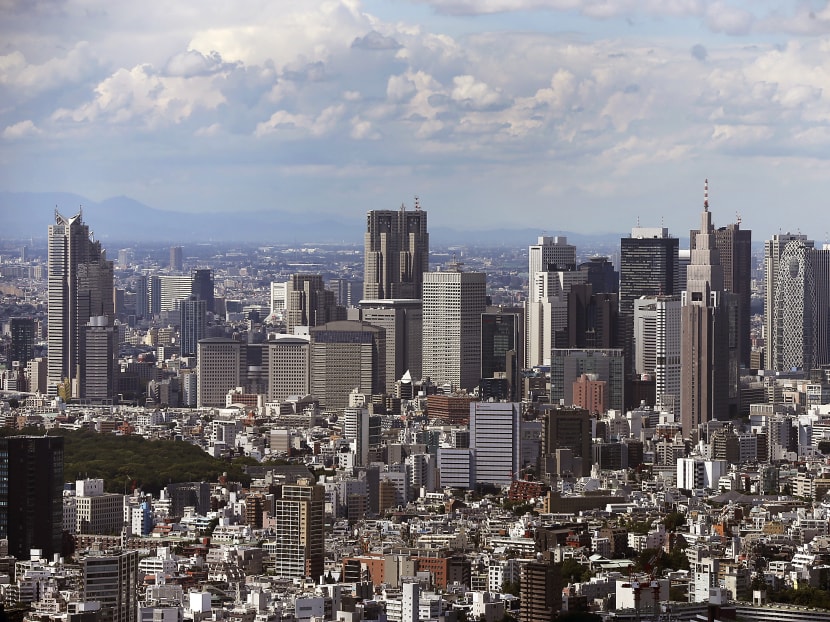Not expensive to invest in Japanese real estate
Japan has been grossly misunderstood to be a high-cost country. Most Singaporeans have the impression that taxes, food, real estate, and so on, are much more expensive in Japan than at home.

Real estate investment in Tokyo can be a very satisfying long-term commitment, given the higher quality of construction and finishes. Photo: BLOOMBERG
Japan has been grossly misunderstood to be a high-cost country. Most Singaporeans have the impression that taxes, food, real estate, and so on, are much more expensive in Japan than at home.
At the very top end, the kaiseki ryori might cost more in Japan than in Singapore, but in terms of value, the dinner there beats the one here. However, in the mass-market segment, the same item in a Japanese rice-bowl fast-food chain, served with better quality beef, costs less in Tokyo than in Singapore.
Real estate investments in Japan are not expensive compared with Singapore, too. A second-hand, freehold studio unit in a prime location within Shinjuku, Tokyo, costs about S$1,600 per sq ft and comes with a gross rental income of 4.7 per cent per year.
The studios are small, with around 230 sq ft of interiors, but there is another 70 sq ft of balcony for exclusive use even though this space is classified as “common area”. Such small sizes are acceptable to the Japanese tenants, who have grown up in a city that has a population density almost twice that of Singapore’s.
In Singapore, a comparable freehold studio unit might cost S$2,500 per sq ft and the area would include the balcony, planter boxes and aircon ledges. And the quality of the finished product lags well behind that in Shinjuku.
Acquisition costs in Japan total about 4 to 6 per cent of the purchase price of the property.
These include a 3 per cent buyer’s commission, stamp duty (which starts from about ¥200 to a maximum of ¥480,000, or S$2.30 to S$5,650, depending on the price of the property), real estate acquisition taxes for land and building, registration taxes, judicial scrivener’s fee and sometimes an upfront, one-off contribution to the building management for newly-built or newly-renovated buildings.
For brand-new properties, no commission is paid, so the acquisition costs are lower.
While the line items are many and look complex, the total costs at the point of purchase are not higher than those for Singapore’s residential investments, especially if we include the Additional Buyer’s Stamp Duty imposed here.
Holding costs in Japan are comparable to Singapore’s levels, too. Maintenance fees payable to the building management may hover around S$0.30 per sq ft per month, or lower for buildings that have no facilities and no attendant building managers.
Tenant management fees — for leasing, rental collection, tenant liaison, etc — range from 2.5 to 5 per cent of the monthly rental, with the top end of the range being the most common rate quoted by good property managers. This is similar to what property agents here charge foreign landlords to manage their tenants in Singapore, and well below the 12 to 15 per cent in London.
Furthermore, in Japan, when the new tenant signs a contract with the landlord, it is customary for the tenant to pay the landlord “key money” equivalent to one month’s rental. I interpret this as an expression of gratitude for the landlord to accept the tenant into his apartment. The key money is considered a gift to the landlord and is non-refundable. It is paid in addition to the two months of security deposit that the landlord holds per two-year tenancy contract.
Most tenants tend to renew their contracts for at least one more two-year term in order to save on the key money and the relocation costs.
There is also a small cost for insurance, both fire (compulsory) and earthquake (not compulsory). For a studio unit, these add up to about S$100 to S$200 per year.
The final part of holding costs involves taxes. Again, there are many line items: Fixed asset taxes for land and building, city planning taxes for land and building, income taxes net of interest expenses and other allowable deductions, but the overall costs are about 10 to 20 per cent of the monthly rental. Added to the 5 per cent tenant management fee, the holding costs amount to about 15 to 25 per cent of the monthly rental income.
Therefore, typically if the gross rental yield — annual rental divided by purchase price — is 5 per cent, the net rental yield may be 4 per cent, a drop of 20 per cent due to tenant management fees and taxes.
Divestment costs are simpler: Property agent fees of 3 per cent, stamp duty on the sale of the property (from ¥200 to ¥480,000) and capital gains tax, if any.
The capital gains tax rate is 15.3 per cent if the property had been held for five years or longer as of January 1 of the disposition year, and 30.6 per cent if it was held for less than five years.
The tax is applied after allowable expenses, such as the sales commission, have been deducted.
There are no restrictions for foreigners at the point of divestment: He or she can sell to another foreigner or a foreign company.
Investing in Tokyo’s apartments is not any more expensive than buying into Singapore’s residences.
Holding costs are reasonable and with the higher rental yield, investors get to enjoy better cash returns on their Tokyo properties than those in Singapore.
Given the higher quality of construction and finishes, real estate investment in Tokyo can be a very satisfying long-term commitment.
About the author:
Ku Swee Yong is a licensed real estate agent and chief executive of property broker Century 21 Singapore. An author of two bestsellers, Real Estate Riches and Building Real Estate Riches, he has just released his third book, “Real Estate Realities – Accommodating the Investment Needs of Today’s Society”.





